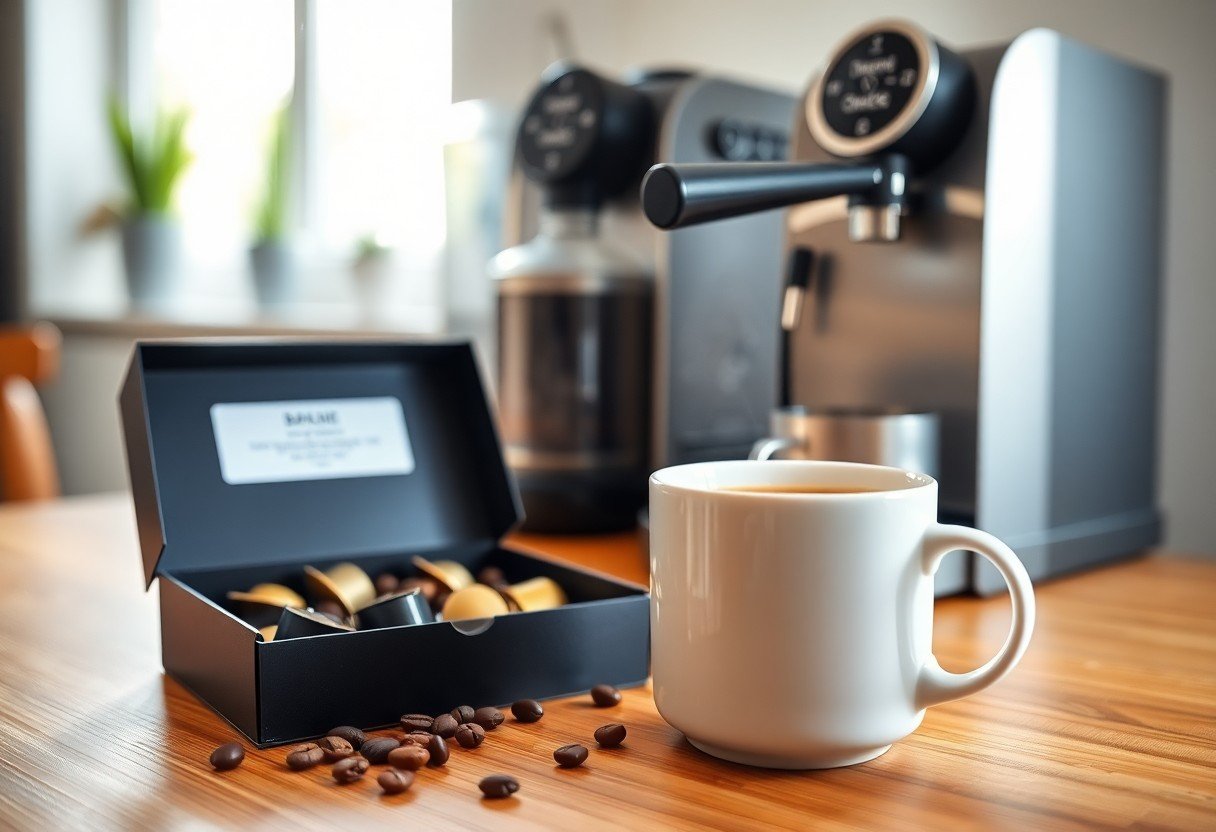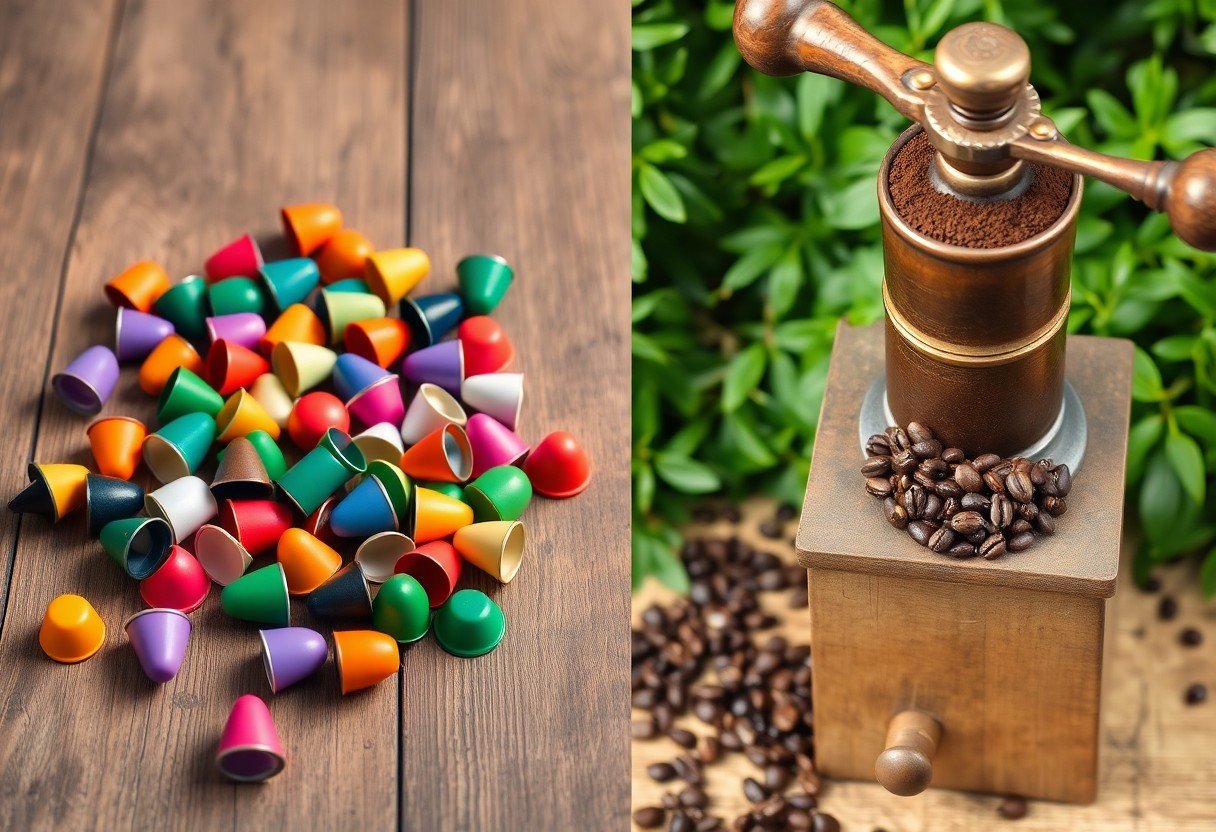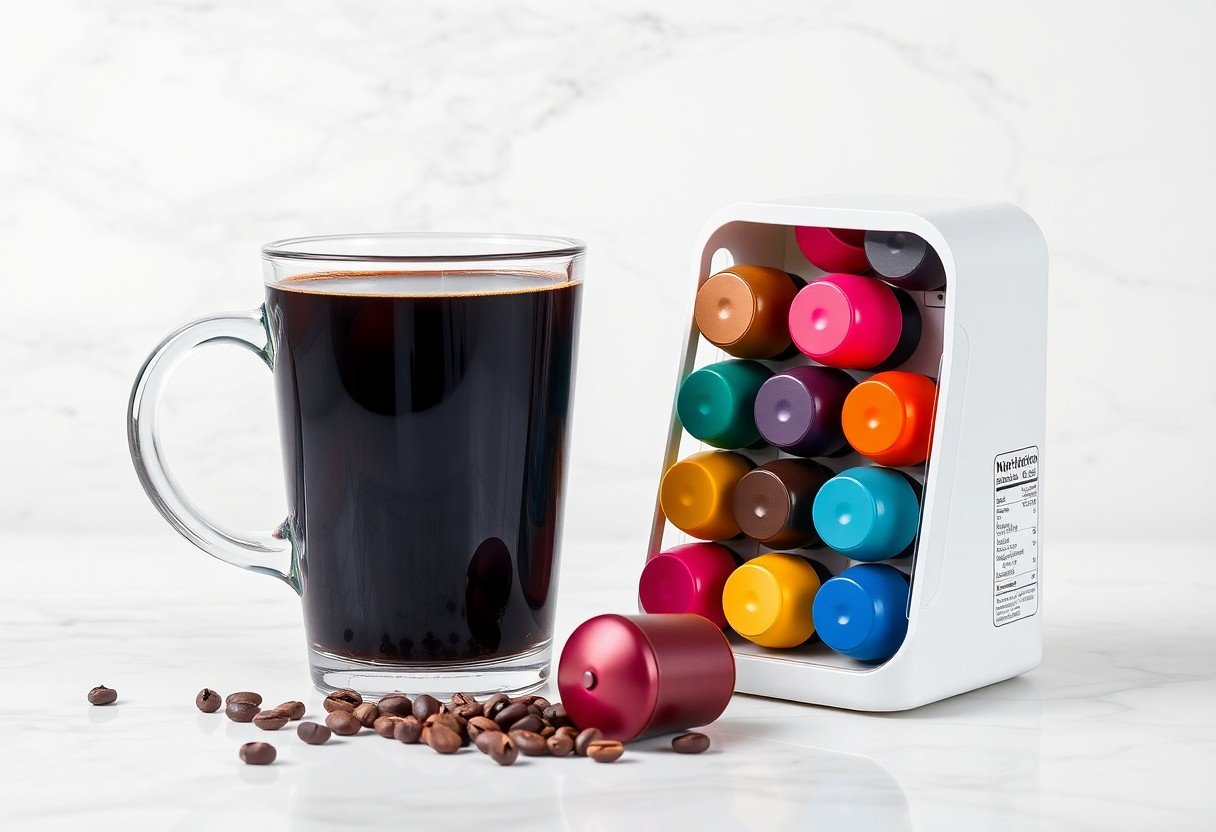Over the years, your choices in coffee have evolved, leading you to ponder whether coffee capsules or ground coffee suits your lifestyle better. Each option presents unique advantages and potential drawbacks, affecting flavor, convenience, and cost. Understanding these differences can help you make an informed decision that aligns with your preferences. For a deeper insight into this topic, you can explore Coffee Beans vs Coffee Capsules.

The Brewing Process: Secrets to Flavor and Freshness
The Role of Grinding in Coffee Flavor
Your coffee’s flavor begins with the grinding process. The size of the grind directly affects the extraction of flavors during brewing. A finer grind increases the surface area, allowing water to extract oils and soluble compounds quickly, which can enhance flavor but can also lead to over-extraction and bitterness if not timed correctly. Conversely, a coarser grind results in slower extraction, often producing a mellower taste profile, but can leave some potential flavors unextracted.
How Capsule Technology Influences Taste
Convenience vs. Craft: Making Life Easier but Sacrificing Experience
Time-Saving Benefits of Coffee Capsules
Coffee capsules appeal to your busy lifestyle by offering a quick and hassle-free brewing process. With just the push of a button, you can have a cup of coffee ready in under a minute, perfect for hectic mornings or when you have multiple tasks vying for your attention. Most coffee capsule machines heat water and brew directly within the device, reducing clean-up time as well—no need for filters or messy grounds. This efficiency allows you to enjoy a freshly brewed cup without the time-consuming steps associated with traditional coffee-making methods.
For those who often find themselves rushing out the door, the ease of coffee capsules means you can grab a cup on your way out without compromising on quality. Many brands offer a wide selection of flavors and strengths, giving you options that suit your taste without having to stock up on various coffee beans. The convenience of capsules ensures you can indulge in a café-quality drink right at home or in the office, streamlining your routine significantly.
The Ritual of Brewing Ground Coffee
Brewing ground coffee embodies a sensory experience that many enthusiasts treasure. The process begins with the aroma of freshly ground beans filling your kitchen, serving as a multi-sensory invitation to begin your day. Measuring out the coffee, boiling water, and watching the brewing unfold allows you to engage with your drink on a deeper level, embracing the moment rather than simply rushing through it. Each step invites mindfulness and appreciation for the craft behind your beverage.
The equipment used in brewing ground coffee also plays a crucial role in the experience. Whether you opt for a French press, pour-over, or espresso machine, each technique has its nuances that impact flavor and texture. For example, using a Chemex allows for a clean cup with distinct flavors, while a French press offers a fuller body. This variety not only enriches your coffee experience but also nurtures a connection to the tradition and artistry associated with each brew method.
Additional tools such as grinders and scales enhance the ritual further, allowing you to experiment with variables like grind size and water temperature, ultimately finding the perfect brew for your palate. This personalized approach fosters a deeper relationship with your coffee, transforming a simple beverage into a cherished ritual that can bring peace and satisfaction to your daily routine.

Environmental Impact: A Closer Look at Waste
The Carbon Footprint of Coffee Capsules
Coffee capsules have surged in popularity, but they come with significant environmental drawbacks. Each capsule is typically made from aluminum or plastic, materials that require substantial energy to produce and often end up in landfills. Some estimates suggest that billions of coffee capsules are discarded each year, contributing to a growing waste problem. The production and disposal processes for these capsules generate greenhouse gases, adding to their overall carbon footprint. You may not realize that the convenience of a quick cup can translate into a substantial environmental cost, impacting your carbon footprint more than traditional brewing methods.
Recycling programs exist for many coffee capsule brands, but participation rates remain low. Even when recycled, the processing can be complicated and energy-intensive. In some cases, the capsules are composite materials, making them difficult to recycle. If you’re looking to reduce your environmental impact, the long-term sustainability of coffee capsules is often called into question, promoting a consideration of alternative brewing methods that may yield less waste.
Sustainability of Ground Coffee Practices
Ground coffee presents several sustainable advantages over coffee capsules. With proper sourcing, you can find brands that prioritize environmentally friendly practices, such as shade-grown coffee, organic farming, and fair trade certification. These methods enhance biodiversity, improve soil health, and support local communities, making your coffee purchases not just a personal choice but also an ethical investment in the ecosystem. Choosing ground coffee also often means fewer resources are expended during production and less overall waste generated, particularly when you use reusable containers or French presses.
The journey of ground coffee from farm to cup can be more transparent than that of coffee capsules. By purchasing whole beans or pre-ground options in bulk, you reduce packaging waste significantly. Additionally, many coffee lovers appreciate the process of brewing, which often involves more sustainable practices such as composting filters and grounds. Opting for reusable brewing methods not only enhances your coffee experience but also aligns with a commitment to a sustainable lifestyle. As you explore your options, investing in sustainably sourced ground coffee could minimize your ecological footprint while savoring the flavors you love.
Cost Analysis: Weighing Value Against Quality
Long-Term Costs of Capsules vs. Ground Coffee
Choosing coffee capsules can often appear convenient, yet the long-term costs add up significantly. A typical coffee capsule can range from $0.60 to $1.00 each, which translates to a staggering $600 to $1000 annually if you consume one cup per day. In contrast, purchasing high-quality ground coffee generally costs between $10 to $20 per pound. A pound can yield roughly 30-50 cups, meaning your per-cup cost could be as low as $0.20, resulting in an annual cost of around $70 to $150 for the same daily consumption.
This stark difference in long-term costs should factor heavily into your decision-making process. While capsules offer immediate convenience, the significantly lower expense of ground coffee can lead to major savings over time. Beyond monetary value, examining the overall quality of your coffee experience will further enhance your appreciation for your daily brew.
Return on Investment: Quality Over Quantity
Investing in quality often yields a more satisfying coffee experience. Ground coffee usually provides fresher, richer flavors compared to many pre-packaged capsules, which can lose their aroma and taste over time. The fresher the coffee, the better the taste and aroma, and opting for ground coffee typically allows you to select superior beans tailored to your preferences, enhancing your daily ritual.
When you compare the pleasure and satisfaction derived from a well-crafted cup of coffee to the ease of using capsules, the return on investment becomes clear. Satisfaction delivered by quality can outweigh the initial convenience offered by capsules. This emphasis on quality, particularly through artisanal or specialty brands, not only transforms your beverage experience but also encourages a more mindful consumption approach that could elevate your overall appreciation of coffee.
Focusing on the flavors and origins of higher-quality ground coffee invites you to explore and enjoy your beverage rather than settling for quick, less impactful options from capsules. Investing time and resources into quality coffee can ultimately transform your daily routine into a richer, more enjoyable experience, where every sip reveals the depth of your choices.

Health Considerations: Nutritional Differences and Additives
Preservatives and Additives in Coffee Capsules
The convenience of coffee capsules often comes at a cost to your health. Many brands use preservatives and additives to prolong shelf life and enhance flavor. Common ingredients include artificial flavors, stabilizers, and sweeteners that can add unnecessary calories and chemicals to your cup. For example, certain flavored capsules may contain diacetyl, a compound linked to respiratory issues. Always check the ingredient list if you’re mindful of what you consume.
Nutritional Benefits of Freshly Ground Coffee
Freshly ground coffee delivers a range of nutritional benefits that can enhance your overall health. Among these benefits are higher antioxidant levels, which play a significant role in combating oxidative stress in your body. Antioxidants present in coffee may reduce inflammation, boost your metabolism, and improve heart health. Research indicates that individuals who consume coffee regularly may also experience a reduced risk of certain diseases, including type 2 diabetes and neurodegenerative disorders.
Moreover, grinding coffee beans shortly before brewing maximizes the retention of crucial oils and compounds that contribute to flavor and health benefits. You’ll find that the fresher the coffee, the more robust the profile in terms of taste and advantageous nutrients. By explicitly selecting whole beans and grinding them yourself, you can customize your coffee experience while reaping all the nutrients it offers.
Summing up
With this in mind, the choice between coffee capsules and ground coffee ultimately depends on your lifestyle and preferences. If you prioritize convenience and speed, coffee capsules may be the better option, allowing you to enjoy a quick brew without the need for elaborate preparation. However, if you value freshness, flavor variety, and control over your brewing process, ground coffee offers a richer experience that can enhance your overall coffee enjoyment.
Moreover, consider the environmental impact of your choice. Coffee capsules can create more waste unless you opt for recyclable or reusable options. By choosing ground coffee, you may reduce your carbon footprint and enjoy a more sustainable brewing method. Weigh your priorities carefully, and select the option that resonates most with your coffee-drinking habits and values.
FAQ
Q: What are the main differences between coffee capsules and ground coffee?
A: Coffee capsules are pre-packaged servings of coffee, while ground coffee is loose grounds that can be measured according to preference. Capsules offer convenience and consistency, whereas ground coffee allows for more control over the brewing process and flavor profiles.
Q: Which option is more environmentally friendly: coffee capsules or ground coffee?
A: Ground coffee is generally more environmentally friendly as it produces less waste compared to single-use coffee capsules. However, some brands offer recyclable or biodegradable capsules, so environmental impact can vary based on the product.
Q: How does the flavor compare between coffee capsules and ground coffee?
A: Flavor can differ significantly; ground coffee often offers a broader range of flavors and aromas due to freshness variations, while coffee capsules may have a more uniform taste profile due to sealed packaging, although some high-quality capsules can provide rich flavors.
Q: Which option is more cost-effective in the long run?
A: Ground coffee is generally more cost-effective, as it is less expensive per cup compared to coffee capsules. Capsules may offer convenience but can add up in cost over time compared to bulk ground coffee purchases.
Q: Are there health differences between coffee capsules and ground coffee?
A: Both options can be part of a healthy diet; however, ground coffee may contain fewer additives, while some coffee capsules could include preservatives or flavorings. Additionally, caffeine levels can vary based on the type of coffee used, regardless of the format.

